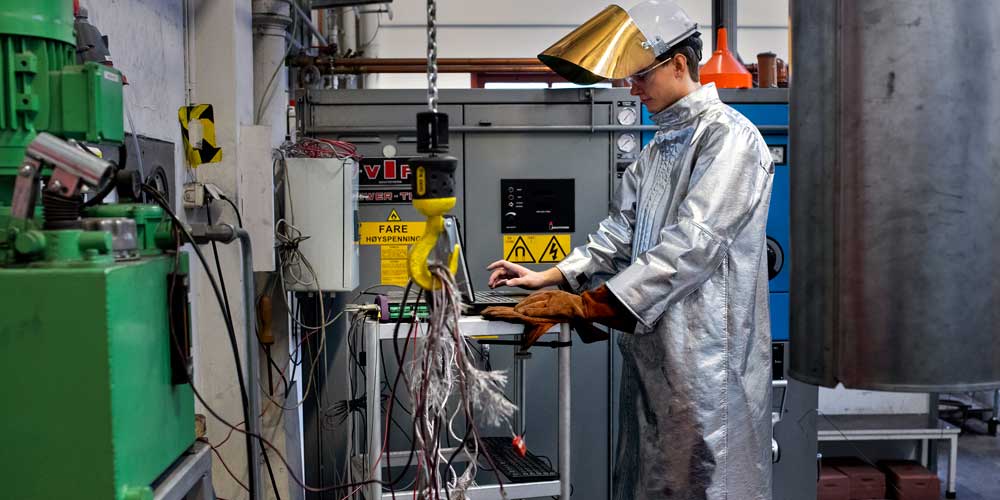What will you learn? - Materials Science and Engineering - Master's Programme
What will you learn?

Do you want to understand and help develop the materials that surround us?
With a Master’s in Materials Science and Engineering, you’ll be a part of an in-demand, innovative industry. Materials are essential as they are part of most constructions, and help save lives. Materials also help create jobs and help to protect and preserve the environment. This is why materials are so important because they provide everything from the shoes we wear to the house we live in, to the energy we use for keeping warm.
Why get a Master in Materials Science and Engineering?
A Master’s in Materials is for those who are curious about why different materials are used for various purposes. You’ll consider how they are made, assembled and how, later, they can be developed and improved. The study provides expertise in areas that are important to Norway as an industrial nation, both today and in the future.
As a material technology student, you will benefit from this expertise and receive an education that is both relevant and career-enhancing in a later job situation.
Many different companies need people with expertise in materials technology, and you as a material technologist will have many opportunities after graduation. At the same time, this study program has small classes with approx. 20 students, which makes it easy to get acquainted with their fellow students. The sense of class, the unity and the personal contact with the faculty teachers at the department make the material technology study unique, and distinguishes it from other university studies.
By choosing to study materials technology at NTNU, you are guaranteed an outstanding and unique experience.
Choose between the following three specialisations to tailor your niche. You may apply directly to:
Materials Science visualised
Material Science may be visualised as the investigation and determination of the relations between the processing, the structure (including composition), the properties and the performance of materials.
- The properties of materials are generally a direct consequence of the composition and the structure, which are a direct consequence of the processing of the material, including choice of and treatment of the raw materials.
- The performance of the materials in applications is a direct consequence of their properties.
- This is illustrated by the sequence indicated to the left.
- Materials Engineering is the utilisation of such scientific know-how to obtain materials with wanted and predictable properties for a certain performance.
- Depending on the availability of suitable materials the task is then to “backtrack” the sequence above as far as needed, and if necessary, design a new processing scheme.
- This can be illustrated as shown by the sequence to the left.
Department of Materials Science and Engineering [DMSE] and this study program is primarily concerned with the base of the pyramid.
An innovate and professional environement
As a student of Materials Science and Engineering at NTNU, you’ll be a part of an innovative professional environment with close links to both industries and research communities. The program offered at NTNU involves the characterisation of the physical and chemical properties of materials covering metals/alloys, ceramics, magnetic materials, optical materials, and semiconductors, as well as superconductors andcomposites. Raw materials and their use in manufacturing processes are essencial topics in Materials Science and Engineering.
Learning outcomes
Learning outcomes
Learning outcome
Knowledge
The graduate from the Materials Science and Engineering Master’s programme
- Has a broad knowledge of mathematics, technology, and computer science, as a basis for understanding methods, applications, professional advancement, and adaptations in materials science.
- Has a broad knowledge of materials science and engineering, as well as in-depth knowledge of recent research and developments within selected areas of the field in accordance with the candidate’s chosen specialization
- Has an advanced understanding of thermodynamics applied to heterogeneous systems relevant for metallurgy and energy storage technologies, and how this can be described and analyzed using thermodynamic models and phase diagrams
- Knows the theoretical foundation for common materials characterization techniques relevant for metallurgy and energy storage technologies
Skills
The graduate from the Materials Science and Engineering Master’s programme
- Can select and perform appropriate experimental techniques for advanced characterization of materials
- Is able to read, understand and critically evaluate recent research literature in their chosen field of specialization, and use this to further their knowledge
- Can contribute to research in materials science and engineering at a high level under skilled academic supervision, and document and communicate the work in written form
General competencies
The graduate from the Materials Science and Engineering Master’s programme
- Understands the role of engineering in a societal perspective
- Has insight in ethical challenges and considerations concerning sustainable development
- Can analyse ethical problems connected to engineering tasks, and contribute to innovation and entrepreneurship opportunities
- Is able to disseminate and communicate engineering problems and/or solutions to specialists and to the general public
- Is able to cooperate in an interdisciplinary environment
- Understands possibilities and limitations of using information and communication technology, including judicial and societal aspects
- Has an international perspective on their profession, and an ability to contribute to international orientation and cooperation
- Is able to advance and adapt professionally and develop professional competence on their own initiative.
